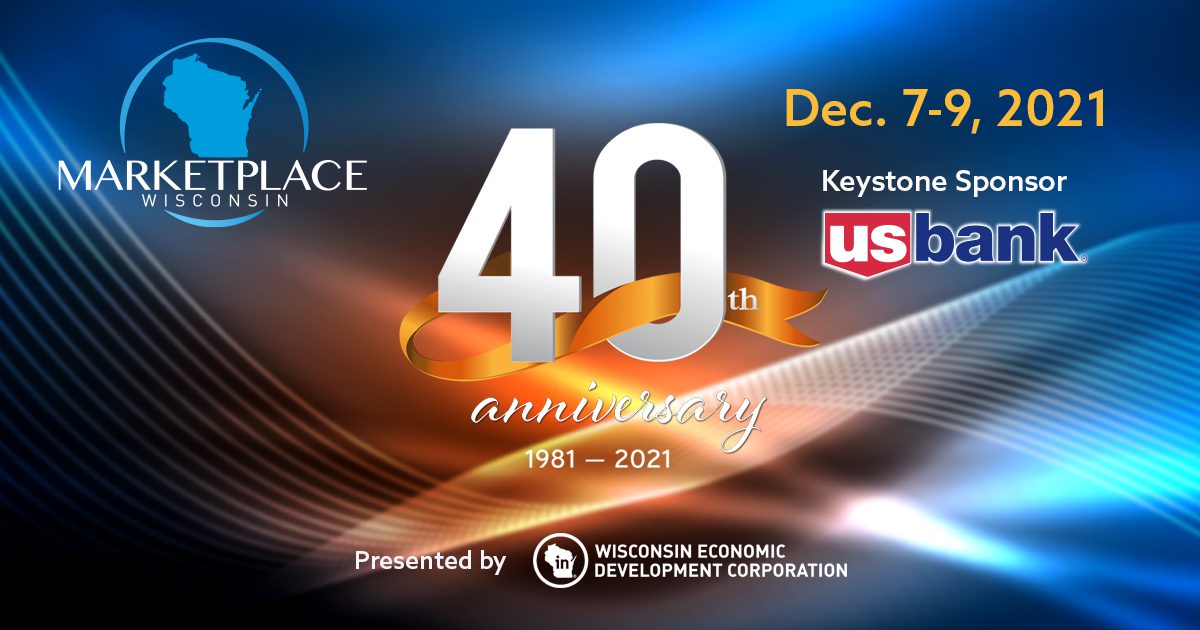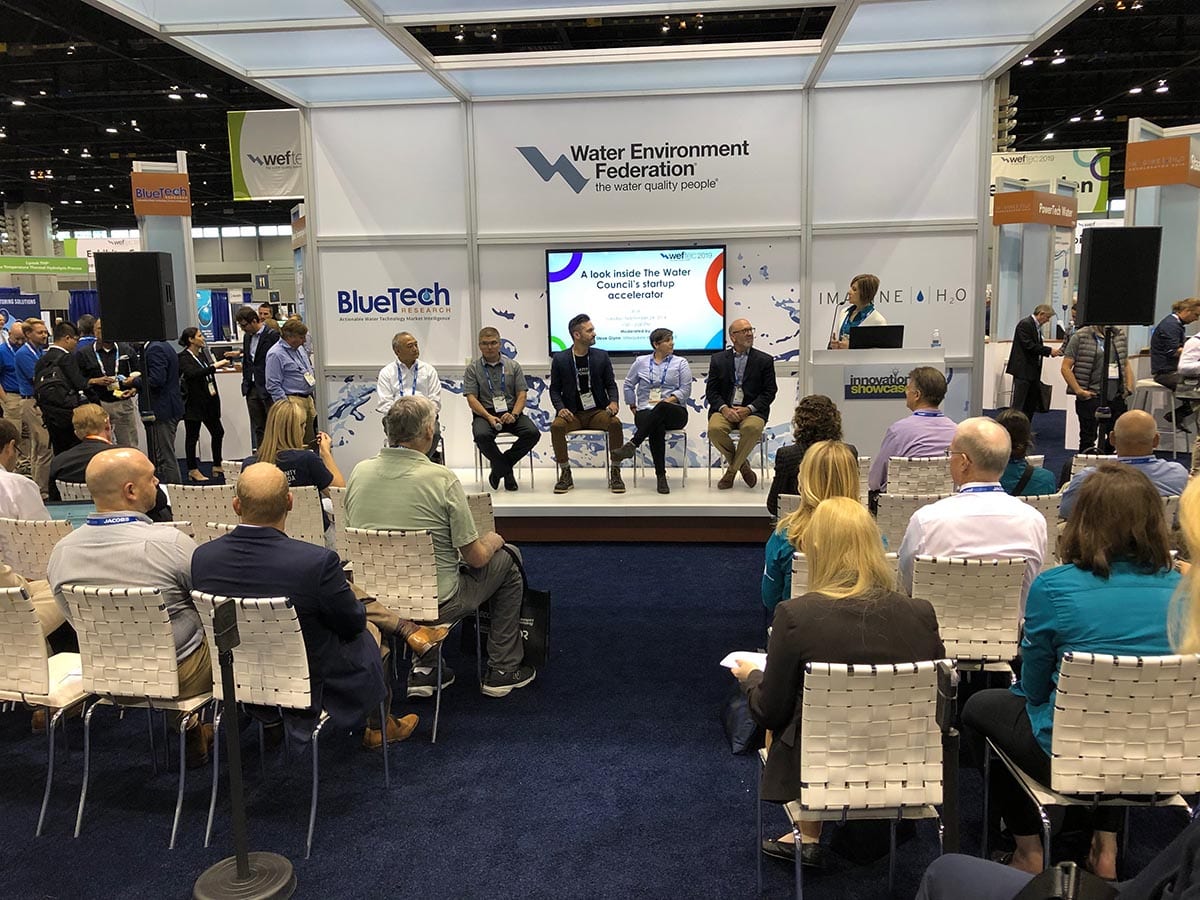
Karen Frost and Steve Glynn of The Water Council announced the opening of the next classes of the BREW and the BREW Corporate for applications this week at WEFTEC in New Orleans.
The Water Council’s BREW (Business. Research. Entrepreneurship. In Water) Accelerator program for water technology startups is now accepting applications for the next round of its program, which will begin in March 2019.
The new round of the BREW, announced this week in New Orleans at the Water Environment Federation’s Technical Exhibition and Conference (WEFTEC) 2018, incorporates several strategic changes designed to increase the program’s effectiveness and impact.
“With five cohorts of the BREW under its belt, The Water Council has developed an expertise for helping water technology entrepreneurs develop their business model, improve their technology, and connect them with market and investor opportunities,” said Steve Glynn, The Water Council’s director of innovation. “The BREW is a great way for early-stage water tech companies to gain meaningful momentum and advance their ideas in an environment unlike any other.”
Also announced at WEFTEC was a separate accelerator program under the BREW Corporate umbrella, in which a company funds an innovation challenge specific to its business needs. Water technology startups, entrepreneurs and researchers whose discoveries pose solutions to that specific problem can apply to participate in the BREW Corporate, and if chosen, will have access to all the resources of the BREW, as well as the sponsoring company’s help in commercializing their discoveries. The newly announced round of the BREW Corporate is powered by A. O. Smith, the Milwaukee-based manufacturer of residential and commercial water heaters and boilers.
“A. O. Smith is proud to be in a position to help support promising startup water technology businesses and to help bring their innovations to life,” said Sam Karge, president of the company’s North American water treatment division. “This is a unique and cutting-edge opportunity for freshwater technology businesses, and we’re pleased to help expedite their path to market.”
“Accelerators are an important tool for helping startups refine their concepts and more effectively use their limited resources,” said Aaron Hagar, vice president of entrepreneurship and innovation at WEDC, which has provided $1.4 million in support of the BREW since the program’s inception. “Industry-focused programs like the BREW provide the inside access to target markets and technical experts necessary for entrepreneurs to build their businesses more effectively and efficiently than they ever could on their own.”
Since the BREW’s inception in 2013, 34 startups have undergone training. Those companies have raised $8.3 million in capital and $13.7 million in additional funding. They have created more than 90 full-time jobs and have completed more than 100 pilots with their products and technologies. A total of 18 patents have been issued, and 22 more are pending, to BREW alumni companies.
BREW companies receive mentorship and coaching as they validate their business models and prepare their products and technologies for commercialization. They also receive feedback from judges on their technologies and business models to prepare them to achieve maximum impact.

The compact, portable and low-maintenance nature of Pulsed Burst Systems’ product makes it ideal for remote locations.
For example, the 2017 winner was Pulsed Burst Systems LLC, whose MegaBubble™ technology is a low-cost, energy-efficient, low-maintenance solution for wastewater treatment. The company’s wastewater treatment units use large, fast-rising bubbles that transfer almost no oxygen into the water. The company’s products have no moving parts, and one blower can run multiple MegaBubble units. They are up to 10 times more efficient than coarse bubble mixers, and also more efficient than most propeller mixers.

The company’s MegaBubble™ technology is engineered to deliver maximum mixing and pumping performance with low energy input, even in environments where minimum oxygen transfer is desired.
“The elegance is in the simplicity,” notes the company’s chief operating officer, Charles Otis, who was at WEFTEC this week with the company’s head of business development, Phil Rickun, looking to make connections to help their product reach beyond the current installations in Waukesha and Milwaukee. Because of the relatively simple design, low cost, low energy demand, and lack of maintenance required, the units are ideal for wastewater treatment in remote locations and areas of the developing world where wastewater treatment infrastructure does not yet exist. Potential applications for the company’s products also include lake deicing and lake turnover prevention.
For 2019, the BREW is being updated to be even more effective in fostering companies’ future success. The length of the program was shortened from six months to three and a half, to make it easier for companies to participate since they are expected to relocate to Milwaukee for the duration of the program.
The program will bring in subject matter experts week by week to support its curriculum in a structured way. In addition, the BREW is now part of the Global Accelerator Network (GAN), which “brings tremendous connections to additional startup resources and access to lessons learned by all of the GAN member accelerators,” said Glynn.
In general, Glynn said there will be more of a focus on connecting the BREW companies within the entire Wisconsin startup community as well as any resources outside of Wisconsin, and connections to the BREW alumni network. “Making valuable connections is important to help these startups continue to advance their ideas,” he said.
Five companies will be chosen for the BREW, and A. O. Smith will choose one or more companies for BREW Corporate, depending on the strength of the applicant pool and how well the applicants align with the problems the company is looking to solve. The BREW Corporate participants take part in all BREW activities along with the rest of the BREW cohort.
For the BREW Corporate, A. O. Smith is looking for early-stage companies with ideas that fall into one or more of these categories:
- Water treatment – High-efficiency residential and commercial drinking water treatment technologies to remove contaminants such as trace heavy metals or microbiological materials, improve taste and odor, and/or eliminate scale formation.
- Water heating – High-efficiency, low-emission water heating technologies, high-performance, cold climate heat pump water heating technologies, thermal energy storage technologies, durable surface finish concepts, and/or components or systems that prolong the life of a water heater.
- Sensors – Cost-effective sensor technologies for continuous or semi-continuous monitoring of trace level contaminants including heavy metals, bacteria and viruses, as well as other water quality indicators, including hardness, total organic carbon, and pH, for residential and commercial drinking water treatment applications.
- IoT, machine learning and artificial intelligence – Technologies used in residential and commercial water heating and drinking water treatment applications that sense, process, and deliver valuable information: for example, predictive analytics that results in extended product life, safer water, or reduced energy consumption. Security technologies to protect users’ privacy or manufacturers’ intellectual property.
More information about both the BREW and the BREW Corporate can be found at watertechhub.com. Applications for both programs are due Nov. 30.






